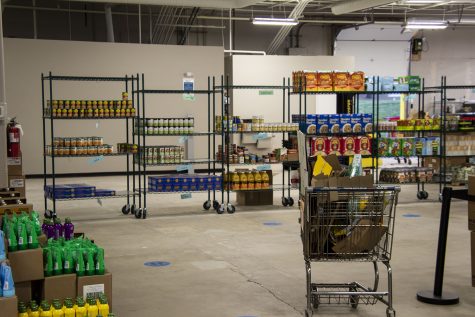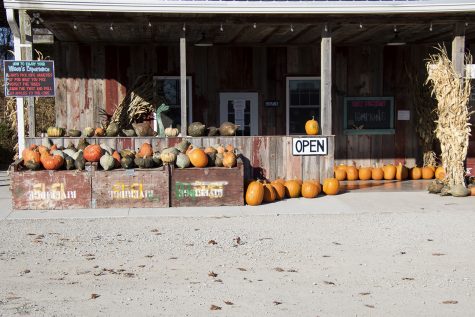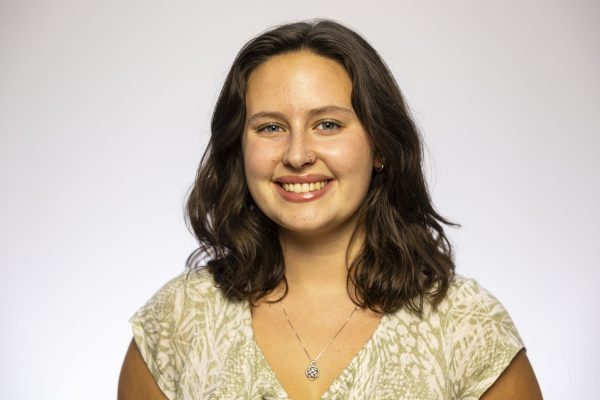Advisers help first year students adjust to college virtually
Academic advisers share the challenges and benefits of advising students online, and how helping students transition into college has been different this semester.
The Tippie College of Business is seen on Monday, January 27th, 2020.
November 11, 2020
University of Iowa first year students are nearing the end of their first semester in college. As they do, academic advisers have been helping them through an unusual college experience and are now busy preparing them for the spring semester.
“First semester is a lot of focus on adjustment to campus, usually not during a pandemic and not trying to do courses online,” said Senior Academic Adviser Diane Crosby. “And that part is very different – having students have to do so much on their own and have to manage time in a pretty intense way. In the past we wouldn’t even put first semester students and online classes just because it’s so challenging to get it right.”
Before the COVID-19 pandemic shut down campus in the spring, advising meetings happened in person in the academic advising office. Now, students have the option of meeting over Zoom or talking over the phone.
Crosby said these virtual appointments have been a good solution for the circumstances, but she misses interacting with students in person. Crosby said body language cues students give off that indicate something is wrong are harder to detect when advisors can only see the face on a screen or hear a student’s voice.
“I think it’s probably going better than we had hoped, but I really miss some of the richness that you can enjoy when you’re in the same room with a student, because I really like students and I feel like I’m only like getting a small piece of them in a way,” she said. “I think it’s easier for a student to come to trust us and feel comfortable after they’ve been with us sitting together because they’re also getting information from us too.”
The virtual format allows students to attend advising meetings from their own space. Crosby said that can feel intrusive at times, but it can also make students feel more comfortable.
Senior Advising Director Jill Trumm said the biggest challenge of virtual meetings is that students don’t always have the privacy to speak openly with their advisor when they are on the call from a shared dorm, apartment, or at their parent’s house.
RELATED: Gap year applications increase during COVID-19 at the University of Iowa
“What really helps students get the most out of their advising conversation is to consider before appointment how their location during that appointment may impact their ability to ask all of their questions, be very honest with us, and super candid about their concerns and their experiences, without an audience in the background,” she said.
Senior Academic Adviser Matt Rhodes has been able to extend his hours and have meetings with students later in the evening.
Rhodes said making his schedule accommodating was guiding his work this semester. Having hours at night gives students who work or have too many people using Wi-Fi during the day a better chance to connect with their advisor.
The pandemic’s effect on the fall semester has also changed the kinds of questions students are asking and how advisers’ resources are being used.
Trumm said this year is like any other in that advisers are still focused on helping first year students with their college transition. However, each student has a unique learning environment depending on where they live and what format of classes they are taking. Students are also struggling with time management because their traditional weekly schedule is happening online and sometimes asynchronously.
At the beginning of the semester, Rhodes said he was helping a lot of students deal with mobility changes as classes they signed up for in the summer were moved online. He has also seen more students struggling with motivation, he said.
“The first month of school I think was really stressful for students, like being half locked in the dorms, cases were really high – just not the college experience they imagined,” he said.
Crosby, Trumm, and Rhodes all emphasized that first-year students have been resilient in navigating their first semester in a virtual and sometimes isolated setting.
“I hope that students know even though we’re virtual, we’re here, we’re happy to help,” Trumm said. “We’re ready to answer your questions and determine that great resource that we would at any time, but particularly with COVID. I know students are struggling with managing everything that they’re expected to manage right now, and I think their advisor would be a really great benefit if they wanted to reach out.”





















